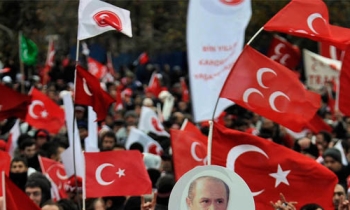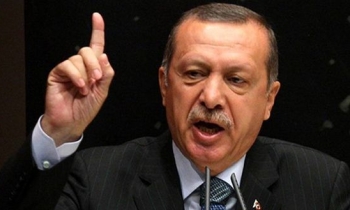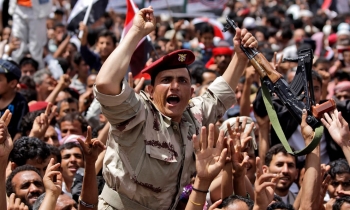Associated Press Executive Editor Kathleen Carroll today called on other news organizations, especially those that use AP services, to increase their attention on imprisoned AP photographer Bilal Hussein, who has been held by U.S. military officials in Iraq for more than six months without being charged.
Saying Hussein “works on behalf of every news organization that receives news from the Associated Press,” Carroll called on columnists and editorial writers at newspapers and other news outlets to focus on his plight and support efforts to release him.
“I wouldn’t presume to tell them what to write, but I would presume to draw their attention to it,” Carroll told E&P Wednesday. “Here is someone who has brought you pictures, images from a critical part of Iraq, who has now been in U.S. military custody for six and a half months, not charged with a crime, not charged with anything, but told he will be held indefinitely because his pictures are unwelcome.”
A Pentagon spokesman, speaking with E&P today, defended the military’s action.
Hussein, an Iraq native, has worked for the news cooperative since 2004, Carroll said. He was picked up by military officials in Ramadi on April 12 and initially held at the infamous Abu Ghraib prison, she said. Since that location closed, he has been detained at Camp Cropper near the Baghdad International Airport, but has yet to be charged with any crime or face any court hearings.
“We all feel incredibly frustrated and angry that, in our view, there is absolutely nothing we have heard from the military consistently other than that they believe his conduct was inappropriate for a journalist,” Carroll said. “We are not saying release the guy. We are saying release him if you are not going to charge him.”
Among the images that likely drew U.S. military interest in Hussein was a 2004 photo he shot of masked insurgents firing on U.S. forces, which was among those that won AP a Pulitzer Prize in 2005.
Pentagon spokesman Bryan Whitman told E&P today that any claim that Hussein has been held because of his photos “is ludicrous. … The concerns with this individual are not because he was out as a photographer gathering news, it goes well beyond that,” he said. “This particular individual, the United States military has some very serious concerns about. They have concerns that he was not out there just doing his job as a working journalist.”
Whitman declined to elaborate on those concerns, referring inquiries to other Pentagon officials with more information. Those individuals did not immediately return calls seeking comment.
He pointed out that the U.S. military in Iraq has “procedures in effect” that essentially call for a quick assessment of working journalists who are held on suspicion of wrongdoing so that they are not kept unfairly. “There have been at least half a dozen in the past several months picked up by U.S. forces and released in relatively short order,” he explained. “Under the U.N. security resolution, you can be held as a security detainee if you pose a threat to the coalition or the Iraqi people.”
Carroll’s comments urging more news focus on Hussein came several days after AP leaders raised the issue of Hussein’s detention during a presentation to the Associated Press Managing Editors conference in New Orleans. At that event last Friday, the news cooperative’s leadership, including AP International Editor John Daniszewski, vented their frustration to hundreds of APME members that military officials have continued to hold Hussein despite any formal charges or proof that he had committed a crime.
“I was surprised at the number of people at APME who had no idea about this,” Carroll said. “I will be interested to see if the editorial pages of the people in that room do something. People seemed generally surprised by what we were telling them.”
Leaders of APME and two other groups, American Society of Newspaper Editors and Associated Press Photo Managers, responded to Friday’s plea with a joint letter to U.S. Defense Secretary Donald Rumsfeld urging Hussein’s release.
Carroll said she knows of few news outlets that have raised the issue since then, but praised today’s Rochester (N.Y.) Democrat & Chronicle for an editorial that said “to hold Hussein without charge and without due process not only chills the work of other reporters and photographers in Iraq but demonstrates the moral bankruptcy of the Bush administration’s attitude on detainees and press freedom.”
Still, she said more needs to be done by news outlets. “I think as an industry, we should be concerned when people are imprisoned because of their work as a journalist,” Carroll said. “I never tell people what to cover. But I think it is worth paying attention. It would be hard for me to see why this was not a newsworthy event.”
Carroll said that if a journalist in the United States had been arrested for covering a story, and held for six months uncharged, his or her plight would no doubt draw more attention. “Put that in any local community, that a local government says they don’t like what a local journalist is covering, that they think it is inappropriate for a journalist and they jail him,” she said. “That would get some attention, people would have some feelings about that. We believe this is jut as important.”
She also stressed that Hussein’s detention should be viewed with the realization that the military works under the agenda of trying to control press coverage as much as it can. “Part of conducting a war is propaganda,” she said. “The United States government, back to the Civil War, has had an interest in controlling information on military maneuvers. That is part of their job. That is not part of our job.”
Joe Strupp (jstrupp@editorandpublisher.com) is a senior editor at E&P.









